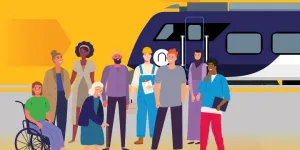
Northern's new trains
We have moved a step closer to the largest ever investment in our fleet which could eventually see up to 450 new trains.
Following confirmation from the Department for Transport, we have now issued an Invitation to Submit a Final Tender (ISFT) to manufacturing candidates, marking a significant step forward in securing new trains to operate across the North of England.
The new trains will be introduced on a phased basis, replacing the oldest units in our fleet, most of which have been in service since the 1980s and 90s. Approximately two thirds of the existing fleet is targeted to be replaced in the next ten years.
The trains will feature a mix of electric, multi-modal (diesel/electric), and battery-powered models, ensuring greater efficiency and sustainability.
Rollout will begin with introduction of electric units on key routes, including between York and Leeds/Huddersfield. This would be followed by multi-modal units introduced in the west, replacing the oldest units there. These upgrades will enhance passenger comfort, reliability, and environmental performance, while simplifying operations.
We are working closely with leading train manufacturers to deliver these modern trains as soon as possible, marking a significant step forward for rail travel across the North of England.
Yes we are. There’s a long and complex process involved with procuring new trains which takes several years to complete – so have moved a step closer by inviting major train manufacturers to begin negotiations for supplying new trains to operate across the North of England.
It's not a quick exercise. We expect to be able to award contracts for new trains in late 2026/early 2027. The timescales for the introduction of the trains will be developed as part of the procurement process, however, we have set bidders challenging targets to deliver as soon as possible with an aim to have first trains delivered to us in 2030.
In November 2025, following confirmation from the Department for Transport, we have issued an Invitation to Submit a Final Tender (ISFT) to manufacturing candidates, marking a significant step forward in securing the next generation of trains for our network.
With ten types of trains in 14 different formations, it makes things more complicated for our operational and maintenance teams. Six of those ten types of train – 57 per cent of our fleet – are between 32 and 40 years old. They are at, or are reaching, the end of their life.
Reducing the number of different types of trains, will significantly simplify operations, help with staff training, and lower maintenance costs.
As we look to the future, with modern signalling, remote monitoring, clean power and the ever-evolving needs of our customers, it’s clear we need new trains to meet those needs.
The objectives of the project to buy new trains are to:
- Remove our oldest rolling stock
- Lower the costs of subsidy requirements
- Reduce maintenance costs
- Improve performance
- Reduce the number of train types we have, reducing complexity
- Improve the experience for our customers and colleagues
We’re looking to deliver our rolling stock replacement strategy over three phases with 'up to 450 multiple units'. The first phases will be around 130 units.
Our invitation to suppliers is for brand new trains. We want to replace our oldest trains with new ones that are built to meet the needs of our business and our network.
The first phase will replace our oldest trains - Class 150, 155 and 156 fleets – and will also support the early stages of the Transpennine Route Upgrade. Phase two will cover the next phase of older trains and diesel-powered trains in the fleet.
Our programme has three lots for the manufacturers to consider - Electric Multiple Units (EMU), Battery-Electric Multiple Units (BEMU), and Multi-mode Multiple Units (MMU) capable of conversion to either a BEMU or EMU during their life.
Only 25% of Northern’s network is electrified, and the infrastructure needed to support a large fleet of battery trains also does not exist right now. Multi-mode units would allow us to be flexible and react to changes that happen to the infrastructure around us. Multi-modal units in the order will be capable of conversion to battery or electric-only operation during their lifetime.
The infrastructure to support hydrogen fuel, particularly across a network as large as ours, does not yet exist. To give ourselves confidence we can deliver new trains onto our network as well as meet environmental challenges we are choosing a mix of future-proofed diesel/electric, electric and battery-electric trains.
The cost of the new trains will depend on the manufacturer and final design.
As Northern is a subsidiary of the Department for Transport’s public sector owning group DfT Operator (DfTO) we are funded by the Government and ultimately the taxpayer - so our new trains will be too.
The process to buy new trains involves a significant amount of governance with both the Department for Transport and HM Treasury to ensure taxpayer money is well-spent.
Following an initial shortlisting process we’ve invited five suppliers – Alstom, CAF, Hitachi, Siemens and Stadler – to enter into discussions for the detailed tender process.
Yes, there will be a chance for public input. As the process moves on we’ll be sharing ideas on designs of the customer areas, here we'll ask for opinions on the interior fixtures, placement and usability.
Any new trains must improve customer accessibility and help to remove barriers for everyone to travel by train. The details of how this can be achieved will be developed as part of the procurement process and, to ensure we provide the best possible solution for our customers, we are already working with the following:
- Our Accessibility User Group
- National Technical Specification Notice (NTSN-PRM) Persons with Reduced Mobility
- Network Rail – Owners and maintainers of the railway infrastructure, including tracks and platforms
- Rail Safety and Standards Board (RSSB) – The railway’s independent safety, standards and research body
- Transport Focus
- Manufacturers and solutions complying with NTSN-PRM
Our customers will enjoy the same technology we offer on our current trains including USB charging, Wi-Fi, digital passenger information and CCTV.
Automatic Selective Door Opening, Automatic Passenger Counting and Remote Condition Monitoring, plus engineering and maintenance systems, will support us with operational performance and maintenance of the new vehicles.
This will be fixed later in the process with the final design determined by the layout, modelling and compliance on accessibility.
This will be determined later in the process when the details of the interior are fixed.
Each three-car and four-car unit will have one standard toilet and one accessible toilet.
Yes, and the number of tables will be determined later in the process.
Yes, and the exact details will be determined later in the process.
No, at Northern we don’t offer a food service on any of our routes.



